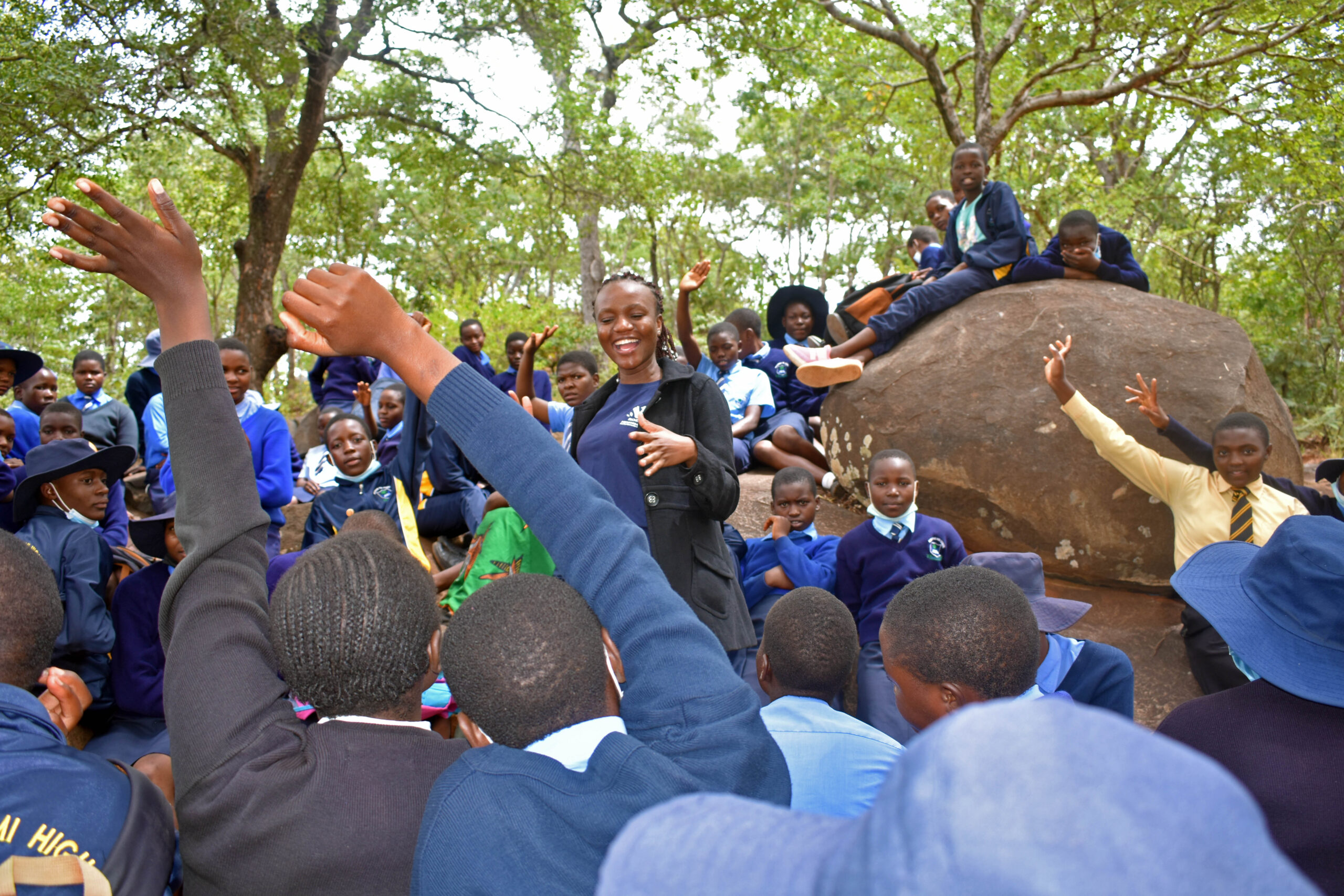Nhanga is a feminist and intergenerational space for advocacy, leadership, mentorship and skills building. Rozaria Memorial Trust developed the Nhanga concept in 2017 to offer a safe space for girls and young women to discuss issues that affect them.
Traditionally, Nhanga is the room where girls sleep and receive information and advise on ways to maintain a happy marriage. For the last 5 years, girls have been conducting the Nhanga dialogues in their respective communities in Murewa and Shamva districts. The girls and young women get to lead conversations on child protection, economic empowerment, SRHR and many other topics that pertain to their rights and wellbeing.
Nhanga yekwa Ruze
My first visit to Nhanga yekwa Ruze the girls and young women came together and convened a mega Nhanga. The girls and young women shared their new year’s resolutions, most of them shared on how they want to perform better in school, while others wanted to be in good health and take care of their parents in near future.
Some of them shared on how they wanted books to help them have knowledge of the world beyond the country they live in. The Nhanga mentor for Ruze village led in the dissemination of Murewa By-Laws on Child Protection and Ending Child Marriages, developed by Chief Mangwende with technical support from Rozaria Memorial Trust.
This exercise indicated that girls and young women are now well-versed in the local bylaws that seek to protect them from violence and abuse. The Nhanga engagements in Ruze Village however also indicated that national laws especially the Marriages Act, needed to be shared in a local language, to help children fully understand that there are laws that exist to safeguard their rights.
The Nhanga conversations also assisted young adolescents to be aware of how the traditional fraternity is protecting them from harmful cultural practices such as kuzvarira and virginity testing to mention just a few harmful cultural practices. During the discussions, the girls shared that, “virginity testing is still taking place in their respective villages and it’s quite difficult to disrespect elders when they are instructing you to do this act”. In Nhanga we then explain the laws of the country, for instance that virginity testing is prohibited by law, and we give the reasons why.
As a resource person who had gone to attend Nhanga yekwa Ruze, I took the opportunity to articulate Chief Mangwende’s bylaws and the position on harmful cultural practices in Murewa District and shared on the referral pathway system in Murewa District in case children experience such form of abuse.
A Safe Space for Learning and Sharing Information
In February, I led the Nhanga session at RMT Educational and Counselling Centre (ECC) with adolescent girls on a range of topics. During the discussions I posed a question on the topic of HIV&AIDS, from the responses I got it was evident that some girls have basic knowledge whilst most of the girls had misconceptions and myths about HIV&AIDS. Some of the misconceptions were, “it’s a disease that causes one to have a slim body and swollen legs”.
This showed me that children are at risk since they are not fully aware of this virus. Chances of these girls being abused and getting infected are very high since they are not aware of the HIV&AIDS transmission and consequences. I was prompted to have a discussion with the girls on the definition of HIV&AIDS in simpler terms for the girls to understand. We also discussed on how the virus is transmitted, expected diet as well as expected communication to people with HIV&AIDS. This session was an eye opener on sexually transmitted diseases, thus Nhanga is a powerful tool on information dissemination as it empowers girls with information on a range of issues.
In-school Nhanga at Mukombami High School
Lastly, the power of Nhanga on imparting knowledge to girls was witnessed at Mukombami High School where RMT convened a session towards the closure of first term. Junior and senior students were separated, and fortunate enough l facilitated the junior’s group.
We dwelt much on bodily autonomy, menstrual hygiene and the concept of bathing. Some of them thought yeast infection is an STI and l took the opportunity to enlighten girls on the causes, effects and medical treatment required. During the dialogue we discussed more on re-usable sanitary especially on handling it to avoid reactions. The Nhanga convening at the school assisted learners on issues to do with their health, especially menstrual health, causes of yeast infections and demystifying some beliefs on issues of menstruation.
Therefore, the Nhanga concept is impacting positively the lives of adolescents through information dissemination, mentorship and leadership on different topics in relation to their personal growth and development. We are pleased that RMT has developed a toolkit to guide the work of girls and mentors in their respective Nhanga. To date, RMT is reaching out to over 3,000 girls in over 20 Community Nhangas in Murewa and Shamva Districts.
